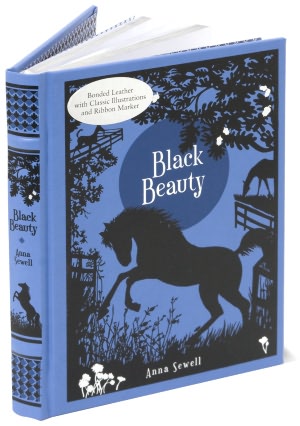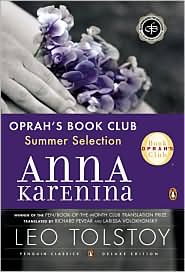Black Beauty. Anna Sewell. 1877. 245 pages. [Source: Bought]
I have been wanting to reread Black Beauty since I finished it in July 2012. I loved it then. I loved it now upon rereading. In fact, I think I loved it even a tiny bit more since I knew exactly what to expect. I was able to relax a bit more, not worrying that something horrible was about to happen. Granted, plenty of horrible things do happen. If not to Black Beauty then to others. But their is a sweetness, a hopefulness to the book that keeps it from being dark and gloomy.
What I loved best about Black Beauty is the narration. From cover to cover, I was engaged with her story, her narration. I loved the writing. The book is rich in description and observation. The worldview of the book has a just-right feel to it. It's very quotable. I loved the characterization. I cared about the horses. I cared about the humans in the story.
If you haven't read it, you should give it a try. Even if you don't like animal stories.
Favorite quotes:
"I wish you to pay attention to what I am going to say to you. The colts who live here are very good colts, but they are cart-horse colts, and of course they have not learned manners. You have been well-bred and well-born; your father has a great name in these parts, and your grandfather won the cup two years at the Newmarket races; your grandmother had the sweetest temper of any horse I ever knew, and I think you have never seen me kick or bite. I hope you will grow up gentle and good, and never learn bad ways; do your work with a good will, lift your feet up well when you trot, and never bite or kick even in play." I have never forgotten my mother's advice; I knew she was a wise old horse, and our master thought a great deal of her.
The next day I was brought up for my master. I remembered my mother's counsel and my good old master's, and I tried to do exactly what he wanted me to do. I found he was a very good rider, and thoughtful for his horse too. When he came home the lady was at the hall door as he rode up. "Well, my dear," she said, "how do you like him?" "He is exactly what John said," he replied; "a pleasanter creature I never wish to mount. What shall we call him?" "Would you like Ebony?" said she; "he is as black as ebony." "No, not Ebony." "Will you call him Blackbird, like your uncle's old horse?" "No, he is far handsomer than old Blackbird ever was." "Yes," she said, "he is really quite a beauty, and he has such a sweet, good-tempered face, and such a fine, intelligent eye--what do you say to calling him Black Beauty?"
"I suppose it is fashion that makes them strap our heads up with those horrid bits that I was tortured with in London," said Ginger. "Of course it is," said he; "to my mind, fashion is one of the wickedest things in the world. Now look, for instance, at the way they serve dogs, cutting off their tails to make them look plucky, and shearing up their pretty little ears to a point to make them both look sharp, forsooth. I had a dear friend once, a brown terrier; 'Skye' they called her. She was so fond of me that she never would sleep out of my stall; she made her bed under the manger, and there she had a litter of five as pretty little puppies as need be; none were drowned, for they were a valuable kind, and how pleased she was with them! and when they got their eyes open and crawled about, it was a real pretty sight; but one day the man came and took them all away; I thought he might be afraid I should tread upon them. But it was not so; in the evening poor Skye brought them back again, one by one in her mouth; not the happy little things that they were, but bleeding and crying pitifully; they had all had a piece of their tails cut off, and the soft flap of their pretty little ears was cut quite off. How their mother licked them, and how troubled she was, poor thing! I never forgot it. They healed in time, and they forgot the pain, but the nice soft flap, that of course was intended to protect the delicate part of their ears from dust and injury, was gone forever. Why don't they cut their own children's ears into points to make them look sharp? Why don't they cut the end off their noses to make them look plucky? One would be just as sensible as the other. What right have they to torment and disfigure God's creatures?"
"He had no business to make that turn; his road was straight on!" said the man roughly. "You have often driven that pony up to my place," said master; "it only shows the creature's memory and intelligence; how did he know that you were not going there again? But that has little to do with it. I must say, Mr. Sawyer, that a more unmanly, brutal treatment of a little pony it was never my painful lot to witness, and by giving way to such passion you injure your own character as much, nay more, than you injure your horse; and remember, we shall all have to be judged according to our works, whether they be toward man or toward beast."
Master said, God had given men reason, by which they could find out things for themselves; but he had given animals knowledge which did not depend on reason, and which was much more prompt and perfect in its way, and by which they had often saved the lives of men.
But what stuck in my mind was this, he said that cruelty was the devil's own trade-mark, and if we saw any one who took pleasure in cruelty we might know who he belonged to, for the devil was a murderer from the beginning, and a tormentor to the end. On the other hand, where we saw people who loved their neighbors, and were kind to man and beast, we might know that was God's mark." "Your master never taught you a truer thing," said John; "there is no religion without love, and people may talk as much as they like about their religion, but if it does not teach them to be good and kind to man and beast it is all a sham--all a sham, James, and it won't stand when things come to be turned inside out."
"Only ignorance! only ignorance! how can you talk about only ignorance? Don't you know that it is the worst thing in the world, next to wickedness?--and which does the most mischief heaven only knows. If people can say, 'Oh! I did not know, I did not mean any harm,' they think it is all right.
"Right, Joe! you did right, my boy, whether the fellow gets a summons or not. Many folks would have ridden by and said it was not their business to interfere. Now I say that with cruelty and oppression it is everybody's business to interfere when they see it; you did right, my boy."
Every man must look after his own soul; you can't lay it down at another man's door like a foundling and expect him to take care of it.
If a thing is right it can be done, and if it is wrong it can be done without; and a good man will find a way.
Our friend stood still for a moment, and throwing his head a little back, "Do you know why this world is as bad as it is?" "No," said the other. "Then I'll tell you. It is because people think only about their own business, and won't trouble themselves to stand up for the oppressed, nor bring the wrongdoer to light. I never see a wicked thing like this without doing what I can, and many a master has thanked me for letting him know how his horses have been used." "I wish there were more gentlemen like you, sir," said Jerry, "for they are wanted badly enough in this city."
"My doctrine is this, that if we see cruelty or wrong that we have the power to stop, and do nothing, we make ourselves sharers in the guilt."
"Is it not better," she said, "to lead a good fashion than to follow a bad one? A great many gentlemen do not use check-reins now; our carriage horses have not worn them for fifteen years, and work with much less fatigue than those who have them; besides," she added in a very serious voice, "we have no right to distress any of God's creatures without a very good reason; we call them dumb animals, and so they are, for they cannot tell us how they feel, but they do not suffer less because they have no words.
© 2014 Becky Laney of Becky's Book Reviews






I have to admit that not only have I never read this classic, I've never really had any desire to. But Becky, I do believe you just changed that! :)
Black Beauty has long been a favourite of mine, ever since receiving a copy from my grandparents one year for Christmas. I still have that original copy, and others too that I have acquired over the years. If there is a horse lover, a lover of animals, a person interested in sociology; this is a must read! I truly cherish this book!
It was too sad!
Aww another great childhood read.
My latest post is of a childhood favorite as well. Its nice revisiting the past every once in awhile
Please visit my post oh my childhood favorite and enter a chance to win a copy.http://inthekitchenandonthecouch.blogspot.com/2012/07/where-red-fern-grows-giveaway.html
Thanks for your great posts.
Meghan